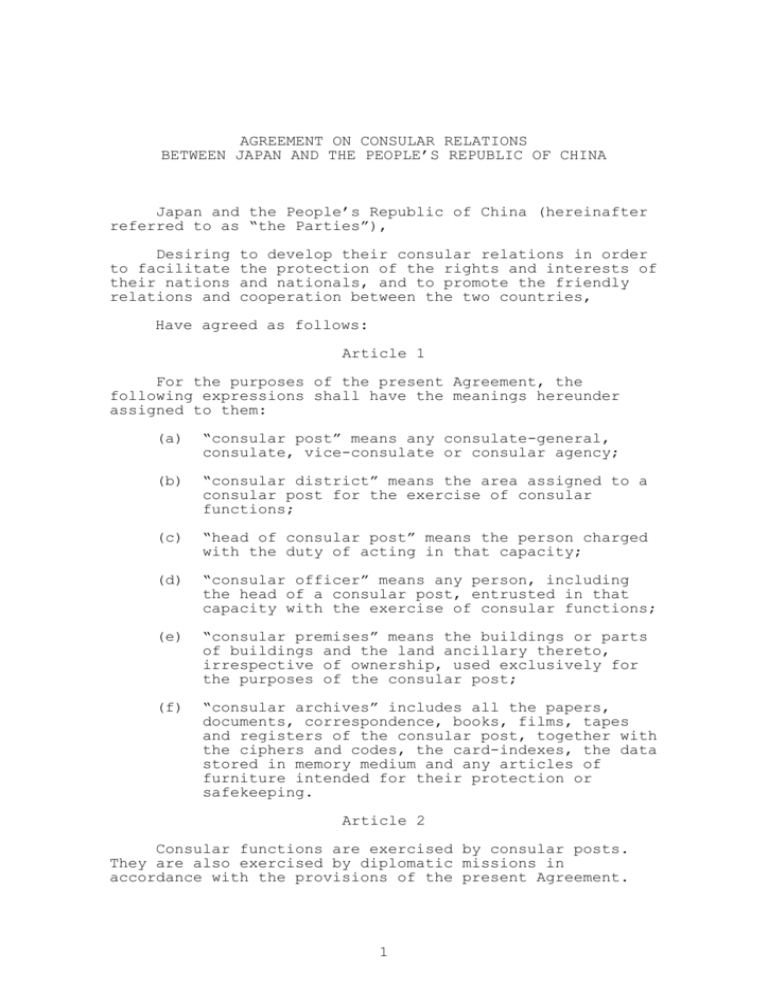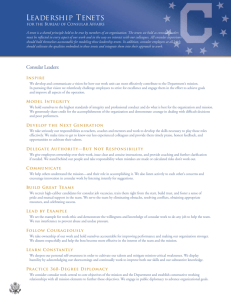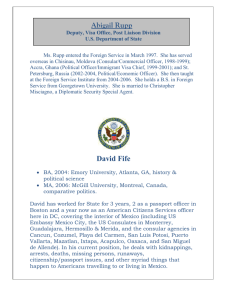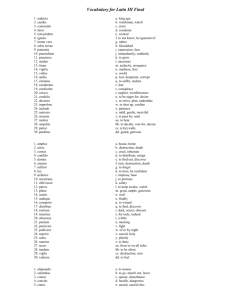Agreement on Consular Relations between Japan and the People's
advertisement

AGREEMENT ON CONSULAR RELATIONS BETWEEN JAPAN AND THE PEOPLE’S REPUBLIC OF CHINA Japan and the People’s Republic of China (hereinafter referred to as “the Parties”), Desiring to facilitate their nations relations and to develop their consular relations in order the protection of the rights and interests of and nationals, and to promote the friendly cooperation between the two countries, Have agreed as follows: Article 1 For the purposes of the present Agreement, the following expressions shall have the meanings hereunder assigned to them: (a) “consular post” means any consulate-general, consulate, vice-consulate or consular agency; (b) “consular district” means the area assigned to a consular post for the exercise of consular functions; (c) “head of consular post” means the person charged with the duty of acting in that capacity; (d) “consular officer” means any person, including the head of a consular post, entrusted in that capacity with the exercise of consular functions; (e) “consular premises” means the buildings or parts of buildings and the land ancillary thereto, irrespective of ownership, used exclusively for the purposes of the consular post; (f) “consular archives” includes all the papers, documents, correspondence, books, films, tapes and registers of the consular post, together with the ciphers and codes, the card-indexes, the data stored in memory medium and any articles of furniture intended for their protection or safekeeping. Article 2 Consular functions are exercised by consular posts. They are also exercised by diplomatic missions in accordance with the provisions of the present Agreement. 1 Article 3 Consular functions consist in: (a) protecting in the receiving State the interests of the sending State and of its nationals, both individuals and bodies corporate, within the limits permitted by international law; (b) furthering the development of economic, commercial, cultural, scientific and technological relations between the Parties and otherwise promoting friendly relations between them; (c) ascertaining by all lawful means conditions and developments in the economic, commercial, cultural, scientific and technological life of the receiving State, report thereon to the Government of the sending State and give information to persons interested; (d) receiving applications for or issuing passports and other travel documents to nationals of the sending State, receiving applications for or issuing visas and appropriate documents to persons wishing to travel to or to pass through the sending State, and amending or endorsing, or invalidating the said passports, visas and documents; (e) helping and assisting nationals, both individuals and bodies corporate, of the sending State; (f) acting as notary and civil registrar and in capacities of a similar kind, and performing certain functions of an administrative nature, provided that there is nothing contrary thereto in the laws and regulations of the receiving State; (g) safeguarding the interests of nationals, both individuals and bodies corporate, of the sending State in cases of succession mortis causa in the territory of the receiving State, in accordance with the laws and regulations of the receiving State; 2 (h) safeguarding, within the limits imposed by the laws and regulations of the receiving State, the interests of minors and other persons lacking full capacity who are nationals of the sending State, particularly where any guardianship or trusteeship is required with respect to such persons; (i) subject to the practices and procedures obtaining in the receiving State, representing or arranging appropriate representation for nationals of the sending State before the tribunals and other authorities of the receiving State, for the purpose of obtaining, in accordance with the laws and regulations of the receiving State, provisional measures for the preservation of the rights and interests of these nationals, where, because of absence or any other reason, such nationals are unable at the proper time to assume the defence of their rights and interests; (j) transmitting judicial and extra-judicial documents or executing letters rogatory or commissions to take evidence for the courts of the sending State in accordance with international agreements in force between the Parties or, in the absence of such international agreements, in any other manner compatible with the laws and regulations of the receiving State; (k) exercising rights of supervision and inspection provided for in the laws and regulations of the sending State in respect of vessels having the nationality of the sending State, and of aircraft registered in that State, and in respect of their crews; (l) extending assistance to vessels and aircraft mentioned in sub-paragraph (k) of this Article, and to their crews, taking statements regarding their voyage, examining and stamping their papers, and, without prejudice to the powers of the authorities of the receiving State, conducting investigations into any incidents which occurred during the voyage, and settling relevant disputes among their crews in so far as this may be authorized by the laws and regulations of the sending State; 3 (m) performing any other functions entrusted to a consular post by the sending State which are not prohibited by the laws and regulations of the receiving State or to which no objection is taken by the receiving State or which are referred to in the international agreements in force between the Parties. Article 4 As soon as the head of a consular post is admitted even provisionally to the exercise of his or her functions, the receiving State shall immediately notify the competent authorities of the consular district. It shall also ensure that the necessary measures are taken to enable the head of a consular post to carry out the duties of his or her office and to have the benefit of the provisions of the present Agreement. Article 5 The receiving State shall accord full facilities for the performance of the functions of the consular post. Article 6 1. Consular premises shall be inviolable. 2. The authorities of the receiving the consular premises except with the of the consular post or of his or her head of the diplomatic mission of the his or her designee. State shall not enter consent of the head designee, or of the sending State or of 3. Subject to the provisions of paragraph 2 of this Article, the receiving State is under a special duty to take all appropriate steps to protect the consular premises against any intrusion or damage and to prevent any disturbance of the peace of the consular post or impairment of its dignity. 4. The consular premises, their furnishings, the property of the consular post and its means of transport shall be immune from any form of requisition for purposes of national defence or public utility. If expropriation is necessary for such purposes, all possible steps shall be taken to avoid impeding the performance of consular functions, and prompt, adequate and effective compensation shall be paid to the sending State. 5. The residence of a consular officer shall enjoy the same inviolability and protection as the consular premises. 4 Article 7 The consular archives and documents shall be inviolable at all times and wherever they may be. Article 8 1. With a view to facilitating the exercise of consular functions relating to nationals of the sending State: (a) consular officers shall be free to communicate with nationals of the sending State and to have access to them. Nationals of the sending State shall have the same freedom with respect to communication with and access to consular officers of the sending State. The receiving State shall not prevent nationals of the sending State from contacting with consular officers, or from entering consular premises; (b) if a national of the sending State, including a person who claims to be a national of the sending State, unless proved otherwise, is arrested or committed to prison or to custody pending trial or is detained in any other manner within the consular district, the competent authorities of the receiving State shall, without delay but not later than four days from the date of the arrest, imprisonment, custody or detention, inform the consular post, irrespective of whether he or she so requests, of the facts and reasons for which the said national is arrested or committed to prison or to custody pending trial or is detained in any other manner. If it is not possible to inform the consular post because of communications difficulties, they shall inform the diplomatic mission of the sending State; 5 (c) consular officers shall have the right to visit a national of the sending State who is arrested or committed to prison or to custody pending trial or is detained in any other manner within their consular district, to converse and correspond, in the language of consular officer’s choice, with him or her and to arrange for his or her legal representation. If consular officers converse in a language other than the language of the receiving State, they shall orally inform the competent authorities of the receiving State of the content of the conversation translated into the language of the receiving State upon request. If consular officers so request, the competent authorities of the receiving State shall arrange for them to visit the national of the sending State without delay. Consular officers shall also have the right to visit any national of the sending State who is in prison, custody or detention in their district in pursuance of a judgment, and to converse and correspond with him or her. Nevertheless, consular officers shall refrain from taking action on behalf of a national who is arrested, in prison, custody or detention if such a national expresses his or her intention to oppose such action in writing and the said authorities present it to consular officers; (d) any communication between the consular post and a national of the sending State who is arrested or committed to prison or to custody pending trial or is in custody in pursuance of a judgment or is detained in any other manner, shall be forwarded by the competent authorities of the receiving State without delay; (e) the competent authorities of the receiving State shall inform a national of the sending State who is arrested or committed to prison or to custody pending trial or is in custody in pursuance of a judgment or is detained in any other manner, without delay of his or her rights under subparagraph (b),(c) and (d) of this paragraph. 2. The rights referred to in paragraph 1 of this Article shall be exercised in conformity with the laws and regulations of the receiving State, subject to the proviso, however, that the said laws and regulations must enable full effect to be given to the purposes for which the rights accorded under this Article are intended. 6 Article 9 If the relevant information is available to the competent authorities of the receiving State, such authorities shall have the duty: (a) in the case of the death of a national of the sending State, to inform without delay the consular post in whose district the death occurred; (b) to inform the competent consular post without delay of any case where the appointment of a guardian or trustee appears to be in the interests of a minor or other person lacking full capacity who is a national of the sending State. The giving of this information shall, however, be without prejudice to the operation of the laws and regulations of the receiving State concerning such appointments; (c) if a vessel, having the nationality of the sending State, is wrecked or runs aground in the territorial sea or internal waters of the receiving State, or if an aircraft registered in the sending State suffers an accident on the territory of the receiving State, to inform without delay the consular post nearest to the scene of the occurrence. Article 10 1. In the exercise of their functions, consular officers may address: (a) the competent local authorities of their consular district; (b) the competent central authorities of the receiving State if and to the extent that this is allowed by the laws, regulations and usages of the receiving State. 2. Upon the request of the consular post, the competent local authorities of the receiving State of its consular district shall, within the limits imposed by the laws and regulations of the receiving State, decide to provide it with such information regarding the situation of public safety in the area under their jurisdiction, including the safety of nationals of the sending State, as may be appropriate. 7 3. The consular post and the competent local authorities of the receiving State of its consular district shall maintain channels of communication between them for emergency preparedness. Article 11 1. The provisions of the present Agreement apply also, so far as the context permits, to the exercise of consular functions by a diplomatic mission. 2. The names of members of a diplomatic mission assigned to the consular section or otherwise charged with the exercise of the consular functions of the mission shall be notified to the Ministry of Foreign Affairs of the receiving State or to the authority designated by that Ministry. 3. In the exercise of consular functions a diplomatic mission may address: (a) the local authorities of the consular district; (b) the central authorities of the receiving State if this is allowed by the laws, regulations and usages of the receiving State. 4. The privileges and immunities of the members of a diplomatic mission referred to in paragraph 2 of this Article shall continue to be governed by the rules of international law concerning diplomatic relations. Article 12 1. The present Agreement shall confirm, supplement, extend and amplify the provisions of the Vienna Convention on Consular Relations, done at Vienna on 24 April 1963 (hereinafter referred to as “the Vienna Convention”) in accordance with paragraph 2 of Article 73 of that Convention. 2. Matters not expressly regulated by the present Agreement shall continue to be governed by the Vienna Convention. 3. Nothing in the present Agreement shall affect the rights and obligations of the Parties under international agreements other than the Vienna Convention and the present Agreement. 4. Nothing in the present Agreement shall affect the rights and obligations between one of the Parties and any third country under the Vienna Convention. 8 Article 13 The present Agreement shall simultaneously apply to the Hong Kong Special Administrative Region of the People’s Republic of China and the Macao Special Administrative Region of the People’s Republic of China. Article 14 Representatives of the Parties shall meet from time to time to consult with each other on consular issues of common concern, including matters arising out of the interpretation or implementation of the present Agreement. Article 15 1. The present Agreement shall be subject to ratification and the exchange of instruments of ratification shall take place at Tokyo. The present Agreement shall enter into force on the thirtieth day after the date of the exchange of the instruments of ratification. 2. The present Agreement may be terminated by either Party by giving written notice through diplomatic channels. Termination shall take effect six months after the date of receipt of such notice. IN WITNESS WHEREOF, the undersigned, being duly authorized by their respective Governments, have signed the present Agreement. 9 Done at Beijing, on this twenty-fourth day of October, 2008, in duplicate in the Japanese, Chinese and English languages, all three texts being equally authentic. In case of any divergence of interpretation, the English text shall prevail. For Japan: For the People’s Republic of China: 宮本雄二 胡正躍 10




